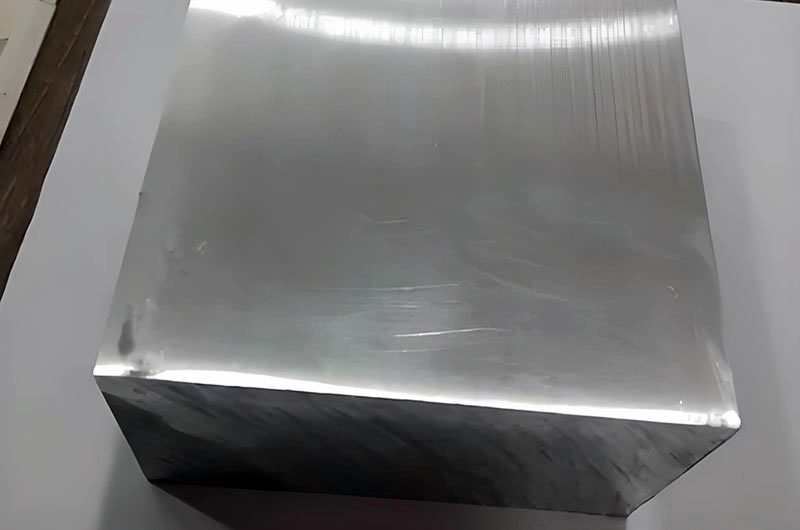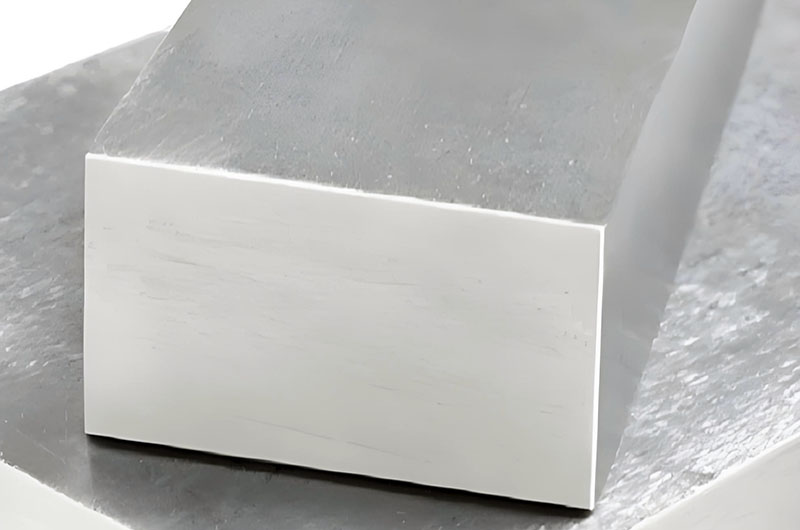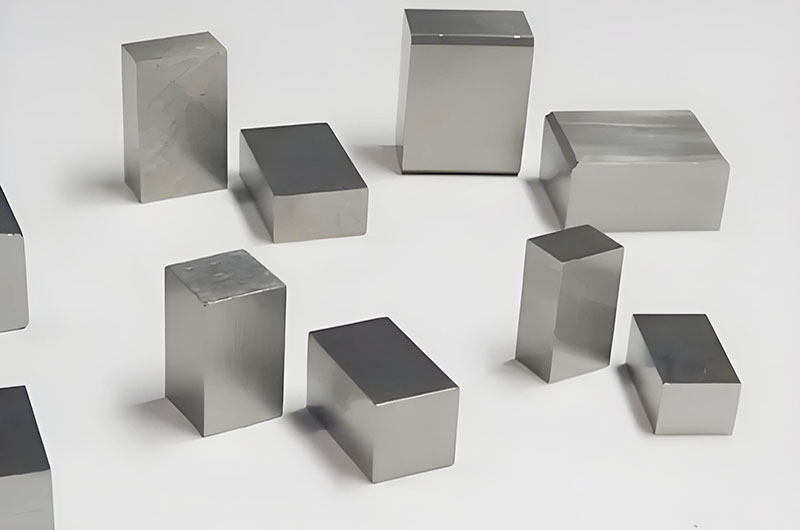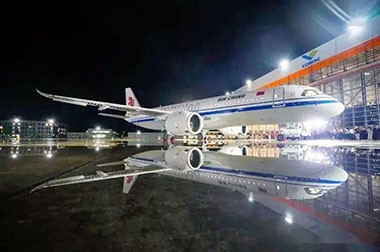7075 Aluminum Block
7075 aluminum block is a super-hard aluminum alloy material formed by adding elements such as zinc, magnesium, copper, and others to aluminum as the base.
7075 aluminum is a heat-treatable alloy primarily composed of zinc, with additions of magnesium, copper, and chromium. It is known for its outstanding strength-to-weight ratio and is commonly used in applications that require high strength and low weight.
7075 aluminum block is highly suitable for applications that require high strength and lightweight properties, particularly in aerospace and high-stress environments. Although it is expensive and has relatively poor corrosion resistance, its performance justifies its use in critical structural roles.

7075 aluminum blocks are cut from hot-rolled sheets or extruded round or square blocks. Haomei Aluminum can provide custom sizes of aluminum blocks. 7075 solid square and rectangular aluminum blocks are widely used in molds, stamping dies, or component manufacturing due to their high strength and hardness. 7075 alloy has good mechanical properties and anodizing response, making it a typical aluminum alloy material used in aerospace, molds, engines, equipment, and other industries.
7075 aluminum is a high-strength alloy primarily used in aerospace, military, and high-stress applications. It is known for its excellent strength-to-weight ratio and is typically used in critical components that require durability under extreme conditions.
7075 aluminum block is valued for its outstanding strength and is used in demanding applications where performance is critical. However, when selecting this material for specific applications, factors like corrosion resistance and machinability should be considered.
7075 Aluminum Block Specifications
| Alloy | Temper | Thickness(mm) | Width(mm) | Length(mm) | Surface Treatment: | Shape: |
| 7075 Solid Square Rectangle Aluminium Block | O,T6,T651,T7451 | 6-300 | 100-2600 | 500-16000 | Mill Finish Anodized Finish. | Square Rectangular |
7075 Solid Square Rectangle Aluminium Block Chemical Composition
| Alloy | Chemical Component (%) | |||||||||||
| Si | Fe | Cu | Mn | Mg | Cr | Zn | Ti | Zr | others | Al | ||
| single | total | |||||||||||
| 7075 | 0.40 | 0.50 | 1.2- 2.0 | 0.30 | 2.1- 2.9 | 0.18- 0.28 | 5.1-6.1 | 0.20 | -- | 0.05 | 0.15 | Remainder |
7075 Aluminum Block Common Temperatures
- T6: Solution heat-treated, artificially aged. Maximizes strength but has lower stress corrosion resistance.
- T651: Stress-relieved, improving dimensional stability.
- T7351: Over-aged, enhancing resistance to stress corrosion cracking.

7075 Aluminum Block Applications
- Aerospace: Aircraft frames, wing spars, landing gears.
- Military: Armor components, weapon parts.
- High-performance sports: Bicycle frames, climbing equipment.
- Automotive: Racing components, suspension parts.
- Machining: Blocks used for CNC machining complex, high-strength parts.
7075 Aluminum Block Advantages and Limitations
Advantages of 7075 Aluminum Block
- Excellent strength-to-weight ratio.
- Good machinability when using appropriate tools (hard carbide recommended).
- Maintains performance at low temperatures.
Limitations of 7075 Aluminum Block
- Corrosion resistance: Lower than 6061; typically requires anodizing or Alodine coatings.
- Stress corrosion cracking risk: In harsh environments, mitigated by over-aging (e.g., T73 tempering).
- Cost: More expensive due to complex processing compared to standard alloys.
Cost Considerations
- Its price is higher than 6061 due to alloying elements and processing techniques.
- Very suitable for applications where strength is matched by cost.
7075 Aluminum Block Machining and Manufacturing
- Machinability: Performs well with carbide tools; required speed is slower than 6061.
- Welding: Not recommended due to cracking; mechanical fasteners are preferred.
- Forming: Limited unless annealed (O temper).

7075 Aluminum Block Corrosion Resistance and Surface Treatment
- Corrosion resistance is naturally lower than 6061.
- Common treatments: Anodizing, chromate conversion, powder coating.
7075 Aluminum Standards and Specifications
- Governed by ASTM B209 (sheet/plate) and AMS 4045 (forgings).
- Can be precision-machined as forged blocks, bars, or plates.
- AMS 4043 (Aerospace Material Specification)
- ASTM B209 (Aluminum Alloy Plate/Sheet Standard)
- MIL-A-22771 (Military Specification)
Comparison with Other Alloys
- Compared to 6061: 7075 is 30-40% stronger but has lower corrosion resistance and more difficult welding.
- Compared to 2024: 7075 has higher zinc content and overall strength; 2024 offers excellent fatigue resistance.
While 7075 aluminum offers excellent strength, it also has limitations:
- Weldability: Poor weldability, and the strength and corrosion resistance of welded joints may be reduced.
- Corrosion resistance: Compared to other aluminum alloys like 6061, 7075 has lower corrosion resistance, making surface treatments like anodizing essential for many applications.
7075 Aluminum Block Processing Methods
7075 aluminum is a high-performance material suitable for demanding applications where strength and weight are critical factors.
| Step | Description |
| Alloy Production | The production of 7075 aluminum starts with the manufacture of the alloy. This process involves melting aluminum and combining it with alloying elements such as zinc, magnesium, copper, and chromium. The molten mixture is then poured into molds and cooled to form solid ingots, serving as the starting material for further processing. |
| Direct Chill Casting (DC) | 7075 alloy material is subjected to direct chill casting to form billets suitable for extrusion or forging. In this process, molten aluminum is poured into molds and cooled, forming a solid shell. The mold is slowly removed from the molten pool, allowing the billet to solidify evenly, creating a fine-grained structure that enhances mechanical properties. |
| Extrusion | The extrusion process forces aluminum billets through a die under high pressure to form the desired profile. The aluminum billet is first heated to about 800°F (427°C) to improve ductility, and then it is compressed through the extrusion machine and forced through the die, producing continuous long shapes. After extrusion, the profiles are cooled and may undergo aging treatments. |
| Forging | Forging is used to produce components with specific mechanical properties and geometric shapes. Aluminum billets are heated to about 700°F (371°C) and then placed between molds, where compressive forces are applied to shape them into the desired form. Forging refines the grain structure, improving strength and fatigue resistance. |
| Heat Treatment | The heat treatment process includes solution heat treatment, quenching, and aging. Solution heat treatment retains the alloying elements, followed by quenching to maintain them in solution. Finally, aging is performed to enhance the alloy's strength and hardness, improving its performance in demanding applications. |
| Machining | After forming and heat treatment, 7075 aluminum can be precisely machined through processes like CNC machining to ensure the product meets strict tolerances and complex geometries, offering excellent machinability. |
| Surface Treatment | To improve corrosion resistance and surface hardness, 7075 aluminum blocks can undergo surface treatments like anodizing, forming a controlled oxide layer that enhances durability, aesthetics, and corrosion resistance. |




